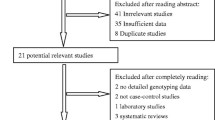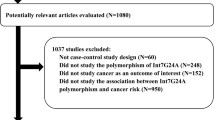Abstract
Several studies have investigated the associations between AURKA T91A polymorphism and the susceptibility to breast cancer, but the results have been inconclusive. To derive a more precise estimation of the relationship, a meta-analysis was performed. A total of 11 case–control studies, including 14,361 cases and 17,780 controls, were selected. Crude odds ratios (ORs) with 95% confidence intervals (CIs) were used to assess the strength of association in the additive model, dominant model, and recessive model. When all the studies were pooled into the meta-analysis, there was no evidence showing a significant association between AURKA T91A polymorphism and breast cancer risk (for additive model, OR = 0.839, 95% CI = 0.678–1.038; for dominant model: OR = 0.890, 95% CI = 0.757–1.074; and for recessive model: OR = 0.987, 95% CI = 0.963–1.012). In the subgroup analysis by ethnicity, significantly decreased risks were found for Asians (additive model, OR = 0.857, 95% CI = 0.742–0.991). When stratified by study design, no significant association was found between the polymorphism and breast cancer risk. In conclusion, this meta-analysis indicates that the AURKA T91A polymorphism is not a risk factor for developing breast cancer.
Similar content being viewed by others
References
American Cancer Society (2009) Breast cancer facts and figures 2009–2010. American Cancer Society, Atlanta
Lichtenstein P, Holm NV, Verkasalo PK, Iliadou A, Kaprio J, Koskenvuo M, Pukkala E, Skytthe A, Hemminki K (2000) Environmental and heritable factors in the causation of cancer–analyses of cohorts of twins from Sweden, Denmark, and Finland. New Engl J Med 343:78–85
Nigg EA (2002) Centrosome aberrations: cause or consequence of cancer progression? Nat Rev 2:815–825
Ewart-Toland A, Briassouli P, de Koning JP, Mao JH, Yuan J, Chan F, MacCarthy-Morrogh L, Ponder BA, Nagase H, Burn J, Ball S, Almeida M, Linardopoulos S, Balmain A (2003) Identification of Stk6/STK15 as a candidate low-penetrance tumor-susceptibility gene in mouse and human. Nat Genet 34:403–412
Miyoshi Y, Iwao K, Egawa C, Noguchi S (2001) Association of centrosomal kinase STK15/BTAK mRNA expression with chromosomal instability in human breast cancers. Int J Cancer 92:370–373
Zhou H, Kuang J, Zhong L, Kuo WL, Gray JW, Sahin A, Brinkley BR, Sen S (1998) Tumour amplified kinase STK15/BTAK induces centrosome amplification, aneuploidy and transformation. Nature Genet 20:189–193
Lau J, Ioannidis JP, Schmid CH (1997) Quantitative synthesis in systematic reviews. Annals Intern Med 127:820–826
Mantel N, Haenszel W (1959) Statistical aspects of the analysis of data from retrospective studies of disease. J Nat Cancer Inst 22:719–748
DerSimonian R, Laird N (1986) Meta-analysis in clinical trials. Control Clin Trials 7:177–188
Munafo MR, Clark TG, Flint J (2004) Assessing publication bias in genetic association studies: evidence from a recent meta-analysis. Psychiatry Res 129:39–44
Egger M, Davey Smith G, Schneider M, Minder C (1997) Bias in meta-analysis detected by a simple, graphical test. BMJ 315:629–634
Couch FJ, Sinilnikova O, Vierkant RA, Pankratz VS, Fredericksen ZS, Stoppa-Lyonnet D, Coupier I, Hughes D, Hardouin A, Berthet P, Peock S, Cook M, Baynes C, Hodgson S, Morrison PJ, Porteous ME, Jakubowska A, Lubinski J, Gronwald J, Spurdle AB, Schmutzler R, Versmold B, Engel C, Meindl A, Sutter C, Horst J, Schaefer D, Offit K, Kirchhoff T, Andrulis IL, Ilyushik E, Glendon G, Devilee P, Vreeswijk MP, Vasen HF, Borg A, Backenhorn K, Struewing JP, Greene MH, Neuhausen SL, Rebbeck TR, Nathanson K, Domchek S, Wagner T, Garber JE, Szabo C, Zikan M, Foretova L, Olson JE, Sellers TA, Lindor N, Nevanlinna H, Tommiska J, Aittomaki K, Hamann U, Rashid MU, Torres D, Simard J, Durocher F, Guenard F, Lynch HT, Isaacs C, Weitzel J, Olopade OI, Narod S, Daly MB, Godwin AK, Tomlinson G, Easton DF, Chenevix-Trench G, Antoniou AC (2007) AURKA F31I polymorphism and breast cancer risk in BRCA1 and BRCA2 mutation carriers: a consortium of investigators of modifiers of BRCA1/2 study. Cancer Epidemiol Biomarkers Prev 16:1416–1421
Cox DG, Hankinson SE, Hunter DJ (2006) Polymorphisms of the AURKA (STK15/Aurora Kinase) gene and breast cancer risk (United States). Cancer Causes Control 17:81–83
Dai Q, Cai QY, Shu XO, Ewart-Toland A, Wen WQ, Balmain A, Gao YT, Zheng W (2004) Synergistic effects of STK15 gene polymorphisms and endogenous estrogen exposure in the risk of breast cancer. Cancer Epidemiol Biomarkers Prev 13:2065–2070
Egan KM, Newcomb PA, Ambrosone CB, Trentham-Dietz A, Titus-Ernstoff L, Hampton JM, Kimura MT, Nagase H (2004) STK15 polymorphism and breast cancer risk in a population-based study. Carcinogenesis 25:2149–2153
Fletcher O, Johnson N, Palles C, dos Santos Silva I, McCormack V, Whittaker J, Ashworth A, Peto J (2006) Inconsistent association between the STK15 F31I genetic polymorphism and breast cancer risk. J Natl Cancer Inst 98:1014–1018
Lo YL, Yu JC, Chen ST, Yang HC, Fann CS, Mau YC, Shen CY (2005) Breast cancer risk associated with genotypic polymorphism of the mitosis-regulating gene Aurora-A/STK15/BTAK. Int J Cancer 115:276–283
Sun T, Miao X, Wang J, Tan W, Zhou Y, Yu C, Lin D (2004) Functional Phe31Ile polymorphism in Aurora A and risk of breast carcinoma. Carcinogenesis 25:2225–2230
Tchatchou S, Wirtenberger M, Hemminki K, Sutter C, Meindl A, Wappenschmidt B, Kiechle M, Bugert P, Schmutzler RK, Bartram CR, Burwinkel B (2007) Aurora kinases A and B and familial breast cancer risk. Cancer Lett 247:266–272
Vidarsdottir L, Bodvarsdottir SK, Hilmarsdottir H, Tryggvadottir L, Eyfjord JE (2007) Breast cancer risk associated with AURKA 91T → A polymorphism in relation to BRCA mutations. Cancer Lett 250:206–212
MARIE-GENICA Consortium (2010) Polymorphisms in the BRCA1 and ABCB1 genes modulate menopausal hormone therapy associated breast cancer risk in postmenopausal women. Breast Cancer Res Treat 120:727–736
Hirschhorn JN, Lohmueller K, Byrne E, Hirschhorn K (2002) A comprehensive review of genetic association studies. Genet Med 4:45–61
Acknowledgments
This work was supported by grants from The National High Technology R&D Program of China (No.2009AA022701), the National Basic Research Program of China (No.2010CB534901), and Postdoctoral Science Foundation of Heilongjiang Province, China (No.LRB 09-292).
Author information
Authors and Affiliations
Corresponding author
Rights and permissions
About this article
Cite this article
Sun, H., Bai, J., Chen, F. et al. Lack of an association between AURKA T91A polymorphisms and breast cancer: a meta-analysis involving 32,141 subjects. Breast Cancer Res Treat 125, 175–179 (2011). https://doi.org/10.1007/s10549-010-0936-6
Received:
Accepted:
Published:
Issue Date:
DOI: https://doi.org/10.1007/s10549-010-0936-6




